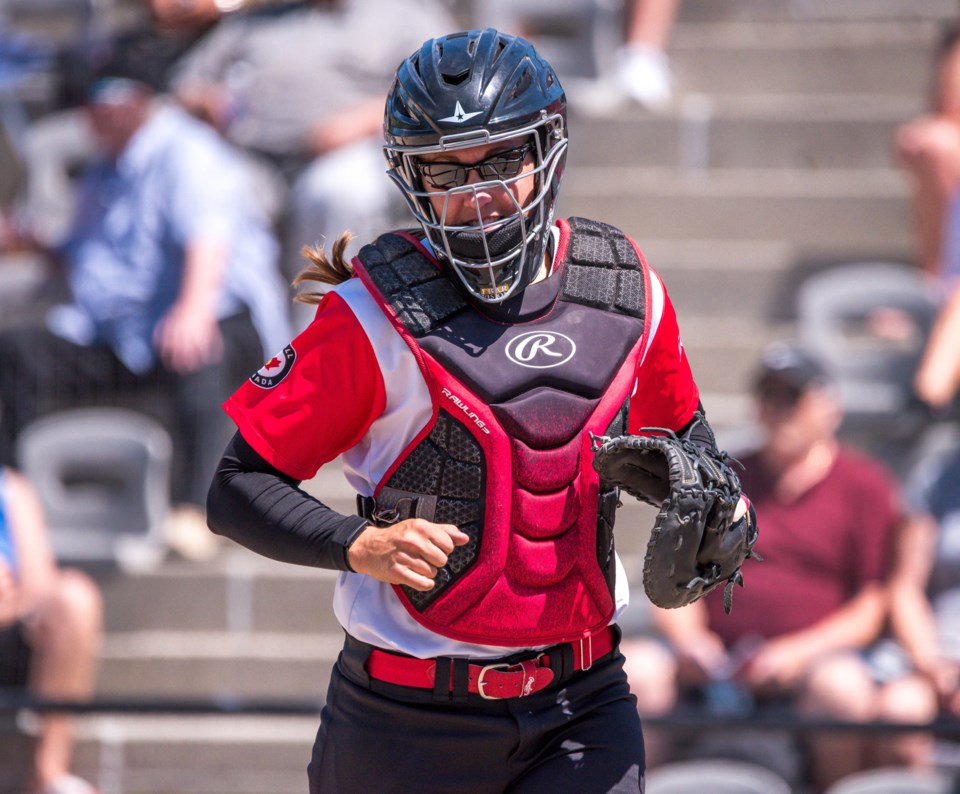Rafter, who hails from Guelph, ON., has been a fixture on the team for years as catcher – joining the team back in 2007, and amassing a rather impressive resume since then, including the Beijing Summer Olympics in 2008.
The Olympic.ca site noted too that “at the WBSC Women’s Softball World Championship she (Rafter), has competed for Canada in every event since 2010 and was part of bronze medal-winning teams in 2010, 2016 and 2018. She has also competed in the last four Pan American Games, taking home silver medals in 2007, 2011 and 2019 to go with a gold medal at the 2015 competition in Toronto.
“At the 2019 WBSC Americas Olympic Qualifier, Rafter hit for a .462 average while swatting three home runs, including the one that walked off the win for Canada to clinch its spot at Tokyo 2020. In her second Olympic (in Tokyo this summer) appearance, Rafter started six games at catcher as Canada won the bronze medal.”
The bronze medal game however was her last for Canada, as Rafter has retired from competitive softball.
After a near 15-year career with the Canadian team this could be an article looking back at a rather lengthy international career for her country, but it is instead about the next chapter she will write in terms of softball.
Rafter, 35, has been named head coach for Canada’s women’s team taking over from Mark Smith who announced his retirement in August.
The step appears a huge one, but perhaps less so for a veteran who has long held an interest in coaching.
“I’ve been playing in the program quite a while,” she said, adding the last several years she has felt she has been something of a player-coach on the side to the point she noted teammates “jokingly referred to me as coach Rafter.”
It was a near inevitable situation given Rafter’s own interests.
“Ever since I was young I’ve gravitated towards coaching,” she said. “I’m passionate about the coaching process so it was a fairly natural transition.”
That interest has been pushed along by Rafter being a catcher, a position that has spawned numerous ball coaches through the years from Joe Torre to John Gibbons to Joe Girardi to Buck Martinez.
Rafter said as catcher “you’re always trying to find a competitive advantage,” and that philosophy transfers directly to coaching.
The big thing coming from catcher, it’s the only position on the field with a view of every play.
“We’re the only ones that see the game from that angle,” she said, adding as a catcher “... you should know where everyone is supposed to be and when they’re supposed to be there.”
That knowledge of knowing what each player’s responsibility is on the field is another thing that will transfer well into Rafter’s coaching role.
Rafter added too that the catcher who has a relationship with umpires and that also provides insights into the game they can draw on.
All that said, it will be a big step given Mark Smith had been in the role for years.
“There’s always a learning curve when one person has done the job the last 12 years,” said Rafter, adding “I think I’m as well-prepared as I could be.”
And prepared Rafter must be since the national team has a busy schedule ahead with the next Women’s Softball World Cup at the World Games scheduled for 2022 and qualifying for the 2024 World Cup also beginning in 2022.
In 2022, the Canadian Women’s National Team is slated to compete at the Canada Cup in Surrey, B.C. (June 20-26), the World Cup/World Games in Birmingham, Alabama (July 9-13) and the WBSC Americas Pan American Championship (dates and location to be determined).
And, of course there is an eye on the Summer Olympics in Los Angeles in 2028, the next opportunity for softball to be involved as they were left off the sport list in Paris in 2024.
“We’re going into hopefully that next Olympic cycle,” said Rafter, who noted the decision of whether softball will be in the ’28 games will be announced in 2023.
With a number of players retiring after the bronze medal win – about half a dozen vets of the team might be part of the team in 2028 – Rafter will be coaching something of a rebuild initially.
“The next few years is almost laying the groundwork,” she said, adding it is certainly her plan to still be coaching the team in 2028.
In the short term Rafter said the Canadian team will be fielding “a lot of young players” who will be gaining “a ton of international experience.”
Retaining young players for the national program will be aided by a positive Olympic announcement for 2028, admitted Rafter in large part because players headed to an Olympics can expect more financial support.
Financial support means a player “doesn’t have to have a full time job” and can focus more on softball, said Rafter.
But, what of Rafter’s last game, the bronze medal winning effort in Tokyo?
“I knew going in that would be my last Olympics, my last time representing the team as a player,” she said.
In the sixth inning of the bronze game against Mexico Rafter admitted the nerves were getting to her, but when the team got out of that inning she felt the game was theirs.
“When we got through the seventh it was pure joy and elation,” she said. “It was the final piece of the puzzle (for her playing career).”

